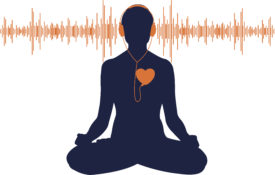-
Americans Are Determined to Believe in Black Progress
APS Member/Author: Jennifer Richeson For two days in early June, as America was erupting in sustained protests over the killing of a Black man, George Floyd, by police in Minneapolis, the most watched movie on Netflix was The Help. The 2011 film—which depicts Black servants working in affluent white households in 1960s Mississippi, and centers on a white female journalist—won acclaim in some quarters. But it has also been criticized as a sentimental and simplistic portrayal of racism—and redemption—amid the cruelties of Jim Crow. To ask what was going on here—why people started watching The Help at a moment of deep racial trauma—is to risk tumbling down a rabbit hole.
-

New Research From Clinical Psychological Science
A sample of research on sexual-trauma, posttraumatic stress disorder (PTSD), pornography use, eating disorders, clinical practice guidelines, and acute stress and cortisol.
-

Health and Happiness Depend on Each Other, Psychological Science Says
New research adds to the growing body of evidence that happiness not only feels good, it is good for your physical health. [July 22, 2020]
-
We’re Trying To Get People To Wear Masks The Wrong Way
The words “please wear a face mask” is on almost every sign that’s posted in the windows of grocery stores, hair salons, and shops. In many places it’s now mandatory to wear a mask and while the a lot people have embraced the new norm, in some parts of the U.S., the requirement to put on a mask has brought about political protests, arrests and violence. In fact, a security guard in Michigan was killed after telling a customer to put on a mask. And a lot of it comes down to how things are communicated. There’s been plenty of critique on the inconsistencies of messaging from public health officials and how that’s made it harder to get people to start wearing a mask.
-
Gordon Bower, Inventive Memory Researcher, Is Dead at 87
APS Past President Gordon H. Bower (1932-2020) Gordon H. Bower, a research psychologist who spent more than half a century studying how the brain learns and remembers, as well as a host of related subjects, and who was among the leaders in his field, died on June 17 at his home in Stanford, Calif. He was 87. Stanford University, where he taught for almost 50 years, announced his death. The cause was complications of pulmonary fibrosis. When Dr. Bower joined the Stanford faculty in 1959, he became part of a psychology department that was already highly regarded.
-
The Role of Cognitive Dissonance in the Pandemic
APS Members/Authors: Elliot Aronson and Carol Tavris Members of Heaven’s Gate, a religious cult, believed that as the Hale-Bopp comet passed by Earth in 1997, a spaceship would be traveling in its wake—ready to take true believers aboard. Several members of the group bought an expensive, high-powered telescope so that they might get a clearer view of the comet. They quickly brought it back and asked for a refund. When the manager asked why, they complained that the telescope was defective, that it didn’t show the spaceship following the comet.

